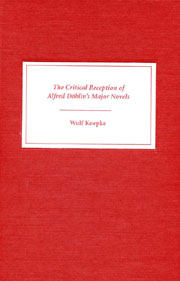2 - Contemporary Reviews after 1933: Döblin in Exile
from Part One - Contemporary Reviews
Published online by Cambridge University Press: 05 February 2013
Summary
Asylum in Paris
AFTER THE BURNING of the Reichstag on 27 February 1933, Döblin was warned that his life was in danger. He left for Switzerland and crossed the border on 2 March 1933. After months of hesitation, the family settled in Paris in early September 1933, and stayed in and around the city until the German offensive of May 1940. In October 1936 the family obtained French citizenship, due to the special protection it afforded and the fact that Döblin's sons would be able to do military service. Döblin missed the work in his medical practice, and moreover, he was forced to concentrate on his writing as his only source of income. Between 1933 and 1940, when he was forced to flee from the advancing German troops, he had produced the novels Babylonische Wandrung, Pardon wird nicht gegeben, the trilogy Amazonas, and was working on his tetralogy November 1918. From 1933 to 1935 Döblin was actively engaged in the Jewish “Freiland” movement, the non-Zionist movement for a national Jewish territory. He also took part in German writers' activities in Paris, and in 1938 he became close to Willy Münzenberg, Arthur Koestler, and Manès Sperber, who were active in a socialist movement against Stalinism, a position voiced in the short-lived journal Die Zukunft.
Although the exile publishers in Amsterdam, Querido and Allert de Lange, were unexpectedly successful, it is evident that the critical response to the publications of exiled writers was much reduced compared to the time before 1933, and that reviews from fellow exiles tended to be friendly rather than incisive.
- Type
- Chapter
- Information
- The Critical Reception of Alfred Döblin's Major Novels , pp. 47 - 69Publisher: Boydell & BrewerPrint publication year: 2003

